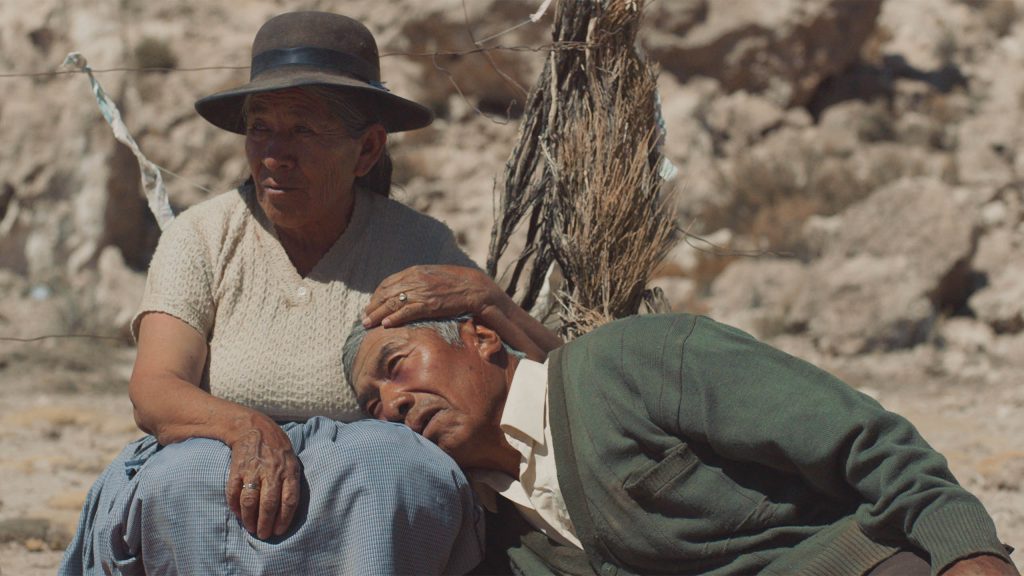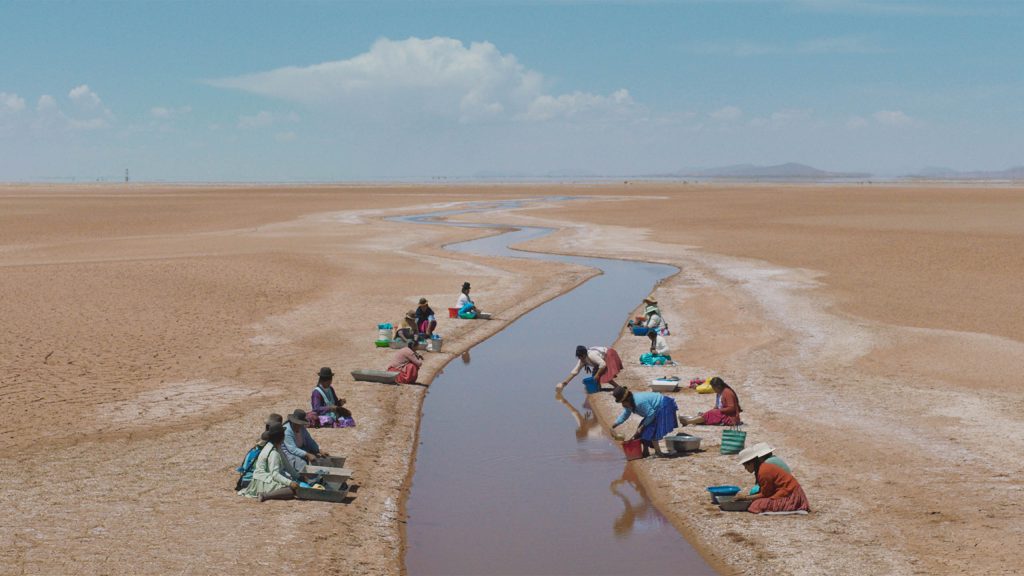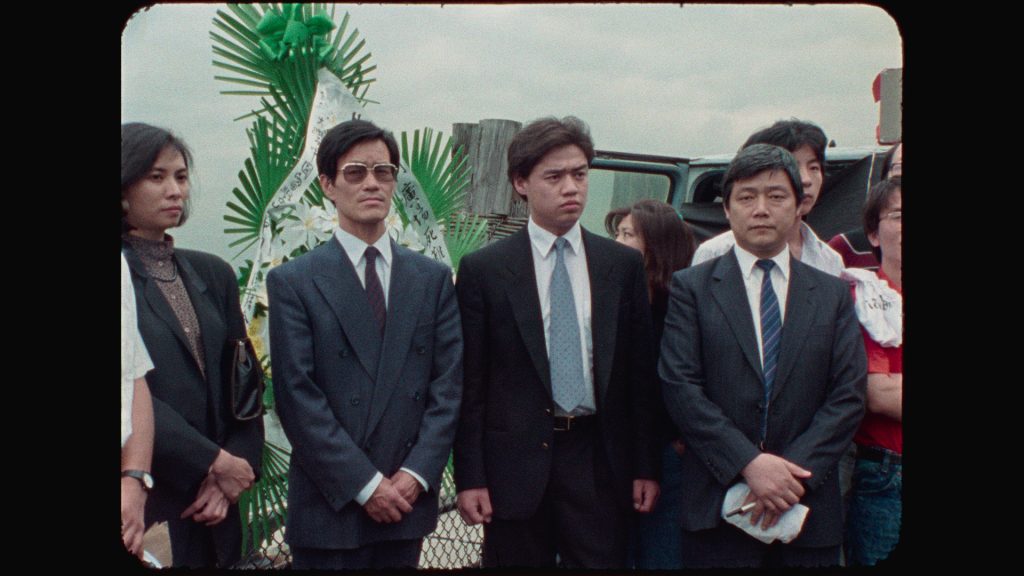February 16, 2022
by Carla Hay

Directed by Alejandro Loayza Grisi
Spanish with subtitles
Culture Representation: Taking place in the highlands of Bolivia, the dramatic film “Utama” features a Latino and indigenous cast of characters representing the working-class and middle-class.
Culture Clash: An elderly married couple, who are dealing with a water drought in their rural area and the husband’s health problems, are visited by their city-dwelling grandson, who tries to convince them to move to the city.
Culture Audience: “Utama” will appeal primarily to people who are interested in meditative movies about family relationships and aging.

“Utama” tells a simple yet effective story that draws parallels between stages of family life and stages in weather conditions. This drama’s slow pacing isn’t going to appeal to all viewers, but it’s a peek into rural Bolivia that can be entrancing. The movie’s cast members also bring such authenticity to their roles, “Utama” could be mistaken for a documentary.
Written and directed by Alejandro Loayza Grisi, “Utama” had its world premiere at the 2022 Sundance Film Festival, where the movie won the World Cinema Dramatic Grand Jury Prize. The movie doesn’t have a lot of dialogue, so viewers should know in advance that there are long stretches of the movie where no one speaks at all. “Utama” has a relatively small number of people in its cast. The movie revolves around three of these characters.
Virginio (played by José Calcina) and his wife Sisa (played by Luisa Quispe) are a happily married, elderly couple living their senior years in their humble ranch abode somewhere in the highlands of Bolivia. Virginio is a llama rancher who spends his days herding and taking care of the llamas. Sisa maintains the house and is responsible for gathering food and water.
They’ve gotten used to their low-key, routine life, except for two big disruptions: A water drought has plagued the area for several months. And, more recently, Virginio has been having a respiratory problem that includes a persistent hacking cough and difficulty breathing. Virginio insists that he feels fine, even though it’s obvious that something is definitely wrong with his health.
One day, Virginio and Sisa get a surprise visit from their grandson Clever (played by Santos Choque), who is in his early 20s. Clever’s father is the estranged son of Virginio and Sisa. The son’s name is never mentioned. The son appears to be the only child of Virginio and Sisa, because there’s no mention of them having any other children.
Throughout the movie, there are hints that Virginio stopped talking to this son years ago, for reasons that aren’t fully explained in the movie. However, what is clear is that Virginio thinks of this son as the “black sheep” of the family. And Virginio’s opinion of Clever isn’t much better. By contrast, Sisa treats Clever in a loving and welcoming way, but Virginio is the dominant and very stubborn spouse in this household.
The biggest flaw in “Utama” is that it tends to be repetitive with any of these three scenarios:
- Virginio insults and argues with Clever, who reacts by denying whatever accusations Virginio throws his way.
- Sisa worries and complains about the drought.
- Virginio coughs and wheezes in an increasingly alarming manner, but he denies that anything is wrong with his health.
As soon as Clever arrives, Virginio accuses Clever of being sent by Clever’s father. Virginio thinks that Clever was sent as punishment for something that Clever did, and that there’s some kind of hidden agenda for this visit. Clever admits that his relationship with his father isn’t going so well, because Clever says that he’d rather stay away from home, so that he doesn’t fight with his father. However, Clever denies that his father sent Clever to visit Virginio and Sisa.
As a peace offering and gifts, Clever has brought some food, which Virginio is not impressed with because he thinks it’s some kind of bribe. And when Clever suggests that Virginio and Sisa move to the city, where they can get access to better health care, Virginio angrily says that he will never move. Sisa seems to want to go along with whatever Virginio decides.
Virginio gruffly says in response to Clever’s suggestion to move to the city: “We’re fine!” Clever replies: “But there [in the city], you could be so much better.” When Clever mentions that Clever’s father thinks it’s a good idea for Virginio and Clever to move to the city, Virginio snaps back: “Your father has no say in this matter!”
More than once, Virginio calls Clever a “brat” or “spoiled.” Virginio thinks Clever is a pampered city boy, so he demands that Clever help him with the llama herding and other ranch duties. Clever reluctantly follows Virginio’s orders. Virginio and Clever argue around the dining table, and Clever usually says some version of “I don’t understand you, Grandpa!” When Virginio gets too insulting toward Clever for Sisa’s comfort, she tells Virginio to stop being so harsh to Clever.
Because of the drought, Sisa has to walk a longer distance than usual to get water. The closest place where she and other people in the area go is a small stream in a desert area. “Utama” has multiple scenes of Virginio, Sisa and Clever doing everyday, mundane tasks. Clever has not said how long he plans to stay, but Virginio is convinced that Clever’s father is using Clever as a messenger to try to persuade Virginio and Sisa to move to the city.
The movie places so much emphasis on the drought and on Virginio’s declining health, it’s very easy to predict how “Utama” is going to end. Before that happens, the movie shows if the strained relationship between Virginio and Clever ends up changing. And although Virginio has a low opinion of Clever’s father, Clever says his father left the area because he didn’t want to be around Virginio anymore. It will make viewers wonder who’s mostly to blame for this father and son having such a bitter falling out.
One of the best aspects of “Utama” is how the cinematography (by Barbara Alvarez) impressively captures Bolivian life in the highlands. There’s a simplicity to this life that’s devoid of urban stresses but brings difficulties in other ways. Clever’s cell phone is the only modern device seen in the movie, which shows a rural lifestyle that has existed for centuries.
Most of all, “Utama” is a compelling snapshot of a specific family’s perspectives and definitions of loyalty and home. It’s an interesting presentation of the dilemma that some people face, when the have to choose between clinging to old traditions or embracing new ways of living. Not everyone watching “Utama” can relate to this rural ranch lifestyle, but most viewers can find some emotional connection to the movie’s characters, who are trying to get through life in the best way that they can, even if not everyone around them agrees with their choices.
UPDATE: Kino Lorber will release “Utama” in select U.S. cinemas on November 4, 2022.





